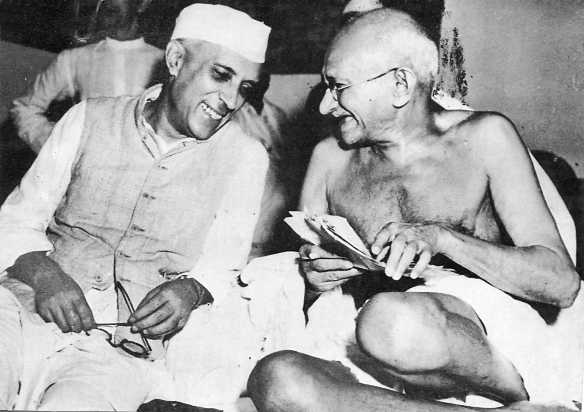M Rajivlochan
This book brings together 60 short pieces excerpted from the writings and speeches of Jawaharlal Nehru. It groups them under six heads and weaves an image of India according to Nehru.
Most are taken from the books of history that Nehru wrote to understand himself, India and the world. The excerpts are followed by another 25 excerpts, this time from writings by others on Nehru. It also includes a long essay that Nehru wrote on Nehru under a pseudonym in which Nehru criticised Nehru for being domineering. “He (Nehru) stands on the seat of the car, balancing himself rather well, straight and seemingly tall, like a god, serene and unmoved by the seething multitude,” is the picture that Nehru paints of Nehru in this essay.
The excerpts also include one from Gandhi’s speech to the AICC on January 25, 1942, in which Gandhi assures the members of the Congress that there is no estrangement between him and Nehru and that he looks upon his protégé to be his political successor. “I have always said,” Gandhi assures the AICC, “that not Rajaji, nor Sardar Vallabhbhai, but Jawaharlal will be my successor.” (p. 319)
Throughout the excerpts one thing stands out, that Nehru considered himself in the role of leading the people of India towards democracy and a more equitable society. He also was quite aware, like his colleague Ambedkar, that Indians are anything but democratic and equitable. Under the circumstances, Nehru saw himself as the kindly light that would lead Indians out of darkness, by explaining to them the importance of their past, of the contingencies of the present, and of a future that they would have to carve out themselves.
Nehru’s radio address to the nation in the context of the first General Election of 1951 has been reproduced in this book at great length. Here Nehru explains to the people the immensity of the task by sharing with them various numbers. The 1,76,600,000 voters, he says, have to elect 4,412 representatives from 2,293 constituencies through 2,24,000 polling booths, under the guidance of, and help from 56,000 presiding officers, 2,80,000 clerks and 2,24,000 policemen. Nehru warns that those contesting elections should not — please note the imperative — use government machinery to win elections. “They (the ministers) must try to separate, as far as possible, their official duties from their electoral or private work.” (p 99)
The last excerpt in this book is taken from Atal Bihari Vajpayee’s tribute to Nehru who had passed away a few days ago. “A dream has been shattered, a song silenced, a flame has vanished in the infinite” Vajpayee remarked. “It was the dream of a world without fear and without hunger.”
In a world where most people do not have the patience to read long and think at all, such small bits of packaged knowledge as are reproduced in this volume, become a source of information to the curious. The editor even makes an effort to print in bold letters those sentences which he thinks the reader should read. Since Indians are intrinsically a high-minded people, given to thinking well of themselves, we dare not re-title this book as ‘Nehru for Dummies’.
There is also a 50-page long and lucid introduction by the editor, a distinguished academic and public intellectual from JNU, who also served as a member of the Union Public Service Commission from 2007-13. The introduction simplifies Nehru’s thoughts even further and establishes their relevance in times when Narendra Modi emerged victorious in the 2019 General Election. “Nehru’s legacy remains”, writes the editor, “the victors will continue to feel defeated” as he invites the reader to savour the excerpted thoughts of Nehru lest Modi win the idea of India and people forget Nehru. (p xi)
This is a welcome book. However, if you are really interested in Nehru, then there is really no option but to go through his writings and speeches, which are now available easily in print. Hopefully, the Nehru Memorial Museum and Library where they all reside, will also make an effort to make digital versions available online of as much material as the heirs of Nehru allow to be made public.
Unlock Exclusive Insights with The Tribune Premium
Take your experience further with Premium access.
Thought-provoking Opinions, Expert Analysis, In-depth Insights and other Member Only Benefits
Already a Member? Sign In Now










